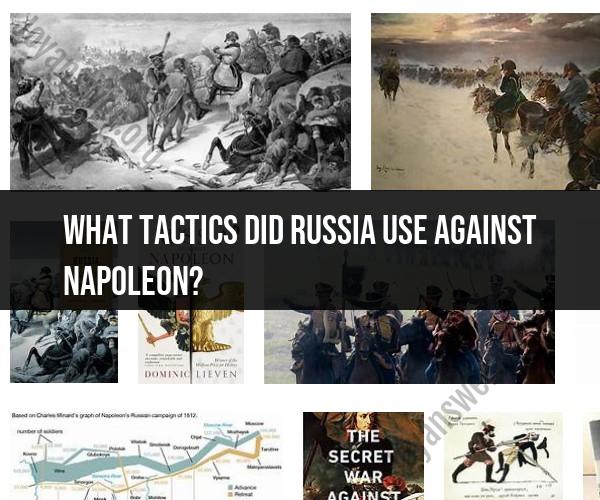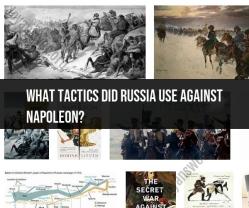What tactics did Russia use against Napoleon?
During the Napoleonic Wars, when Napoleon's Grande Armée invaded Russia in 1812, the Russian military employed several tactics and strategies to counter the French invasion. Some of the key tactics and strategies used by Russia against Napoleon's forces include:
Scorched Earth Policy: One of the most famous tactics employed by the Russians was the scorched earth policy. As the French advanced deeper into Russian territory, the Russians retreated and systematically destroyed or removed anything of value, including crops, buildings, and supplies. This denied Napoleon's army the resources they needed to sustain themselves and forced them to rely on already stretched supply lines.
Attrition and Delay: The Russian army avoided direct confrontations with Napoleon's forces, instead choosing to engage in hit-and-run tactics, skirmishes, and small-scale battles that inflicted casualties on the French while minimizing their own losses. The goal was to wear down the enemy through attrition.
Strategic Retreat: Russian forces retreated deeper into Russian territory, drawing Napoleon's army farther from their supply lines and deeper into the harsh Russian winter. This strategy was intended to weaken and demoralize the enemy while exposing them to the harsh winter conditions.
Scarcity of Supplies: By destroying or removing supplies and engaging in strategic retreats, the Russians ensured that Napoleon's army faced severe shortages of food, ammunition, and other essentials. This weakened the French forces over time.
Partisan Warfare: Russian irregular forces and partisans harassed French supply lines, disrupted communications, and conducted guerrilla warfare tactics, making it difficult for Napoleon to maintain control of the occupied territories.
Alliance Building: The Russians sought alliances with other European powers, including Prussia and Austria, to form a coalition against Napoleon. This ultimately led to the Sixth Coalition and the defeat of Napoleon in 1814.
Battle of Borodino: The Battle of Borodino, fought on September 5, 1812, was a major engagement where the Russian army under General Mikhail Kutuzov temporarily stood and fought Napoleon's forces. Although it was a bloody battle, the Russians retreated afterward, allowing Napoleon to occupy Moscow.
Retreat from Moscow: As the harsh Russian winter set in and with Moscow in ruins, the Russians continued their retreat, avoiding direct engagements and forcing the French to withdraw. Napoleon's army suffered greatly during the retreat due to the brutal winter conditions and constant Russian harassment.
These tactics, particularly the scorched earth policy and the strategic retreat, played a significant role in the ultimate defeat of Napoleon's invasion of Russia. By denying the French army the resources and shelter they needed, Russia weakened Napoleon's forces, leading to their eventual downfall and Napoleon's retreat from Russia in a disastrous campaign.
Napoleon's Russian Campaign: Tactics and Strategies Employed
Napoleon's Russian campaign was a major turning point in his military career. He invaded Russia with a massive army of over 600,000 men, but he was ultimately defeated by the Russian army and the harsh Russian winter.
Napoleon's tactics and strategies during the campaign were based on his previous successes in Europe. He planned to quickly defeat the Russian army in a decisive battle and then force the Russian Tsar to surrender.
Napoleon's army moved quickly through Russia, but the Russian army refused to engage in a decisive battle. Instead, the Russians retreated, burning villages and crops in their wake. This tactic, known as scorched earth warfare, made it difficult for Napoleon's army to find food and supplies.
Napoleon eventually caught up with the Russian army at the Battle of Borodino in September 1812. The battle was a bloody stalemate, but it left Napoleon's army weakened and demoralized.
Napoleon continued to advance towards Moscow, but the city was abandoned by the Russian army and its inhabitants. Napoleon entered Moscow on September 14, 1812.
Napoleon planned to winter in Moscow and resume his campaign in the spring. However, the Russian army began to surround Moscow and cut off Napoleon's supply lines. Napoleon was forced to evacuate Moscow in October 1812.
The retreat from Moscow was a disaster for Napoleon's army. The soldiers were harassed by the Russian army and suffered from hunger and cold. Thousands of soldiers died on the retreat.
Napoleon's army finally reached the border of France in December 1812. Napoleon had lost over 400,000 men in the Russian campaign.
The Russian Response: Tactics Used Against Napoleon's Invasion
The Russian army used a variety of tactics to counter Napoleon's invasion. One of the most important tactics was scorched earth warfare. The Russian army burned villages and crops in their wake, making it difficult for Napoleon's army to find food and supplies.
The Russian army also used Fabian tactics. This meant that they avoided decisive battles and instead retreated, harassing the French army along the way. The goal of Fabian tactics was to wear down the French army and force it to retreat.
The Russian army also used the harsh Russian winter to their advantage. Napoleon's army was not prepared for the cold weather, and thousands of soldiers died from exposure.
Battle of Wits: Analyzing Military Tactics in the Napoleonic Wars
The Napoleonic Wars were a time of great innovation in military tactics. Napoleon was a master of military strategy and tactics, and his armies were among the most effective in history.
However, the Russian army was also able to adapt to Napoleon's tactics and develop their own effective strategies. The Russian army's use of scorched earth warfare and Fabian tactics was particularly effective against Napoleon's army.
The Battle of Borodino is a good example of the tactical battle of wits between Napoleon and the Russian army. The battle was a bloody stalemate, but it left Napoleon's army weakened and demoralized. This ultimately led to Napoleon's defeat in the Russian campaign.
Conclusion
The Napoleonic Wars were a time of great innovation in military tactics. Napoleon was a master of military strategy and tactics, but the Russian army was also able to adapt to Napoleon's tactics and develop their own effective strategies. The Russian army's use of scorched earth warfare and Fabian tactics was particularly effective against Napoleon's army.



